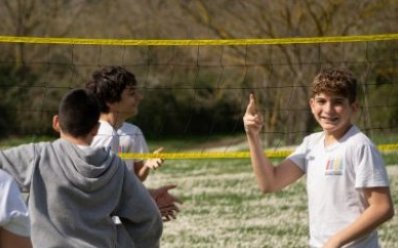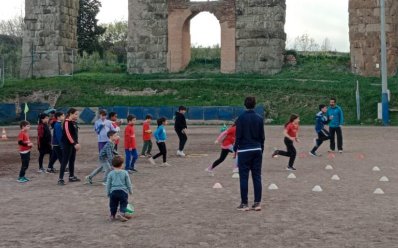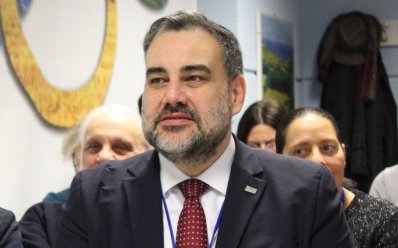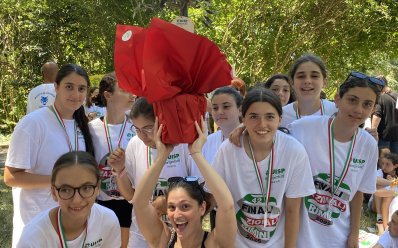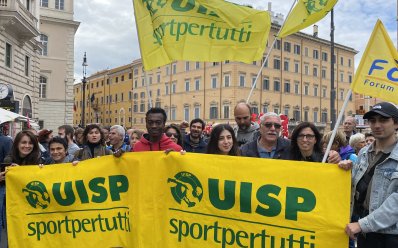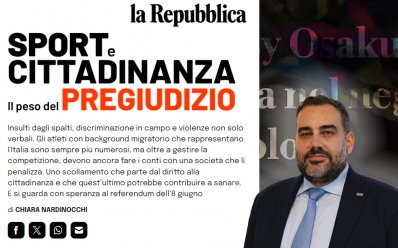Reflection on the European sports model of the future begins
The kick-off meeting for the European Real European Sport Model project was held in Copenhagen. Vincenzo Manco spoke at the event
From 3 to 5 March, the kick-off meeting for the European Real European Sport Model project was held in Copenhagen. The project is coordinated by ISCA (International Sport and Culture Association), of which Uisp is a partner alongside four other European organisations: Azur Sport Sante and Universite Cote d'Azur (France); Idraettens Analyseinstitut and DGI and Ido-International Dance Organisation (Denmark); SUS (Slovenia). The three-day meeting saw the partners discuss the main activities of their respective organisations, following a brief overview of the European sports model and the activities that characterise it today, with an overview of its objectives, activities and target audience.
"The main objective of the project is to ensure sports governance based on concrete data, promote policy choices that are more consistent with widespread sports activities,’ explains Vincenzo Manco, head of the Uisp Study Centre and Third Sector, ’and build a shared concept of sport in Europe by supporting, at national and European level, policies based on solid evidence about the organisational and financial diversity of the sports system. This data will enable a more informed debate on the future of sport and physical activity on the continent, through greater citizen involvement".
In fact, supporters of the so-called European sports model promote a pyramidal structure, the principle of relegation/promotion and financial solidarity, with sports federations having a monopoly on the organisation of sport in general. This is contrary to the reality of the diversity of sports organisations in Europe and the principle of freedom of association. The EU study on the European sports model briefly mentions this aspect but does not provide further analysis. "Since broad participation in sport and physical activity is an official objective of the EU and Member States, it is necessary to provide reliable data on the diversity of sports organisations and how they contribute to meeting the changing needs of citizens in terms of sport and physical activity. It is also necessary to dispel the myth of the pyramid model of sport, which has completely changed over time, in order to ensure development that is more inclusive and based on a redistribution of financial resources based on solidarity".
In particular, the project will focus on two significant but little-considered aspects of sport in Europe, with a view to eventually proposing a new European sports model: the diversity of organisational structures providing sports and physical activity in Europe and the financial flows of sports participation in Europe.
"During the three days of work, we analysed the positions of the partner organisations with regard to the political debate with the institutions on the existing sports model in each of the countries they represent", continued Manco. "We also looked in depth at the main expectations of the project and the impact it may have on public opinion, the media, institutions and sports systems, as well as on the European Commission. The tasks and deadlines were addressed through a discussion of the documents and research to be produced as a prerequisite for the implementation of the project. We also discussed how to map the organisational structures that promote and organise sport and physical activity in Europe and how to use the tools to communicate the project: videos, infographics, articles and opinions. Finally, we discussed the type of advocacy to be developed, which will be the main task entrusted to Uisp, and the evaluation process to be carried out by the University of Cassino".
Funded by the European Union. Views and opinions expressed are however those of the author(s) only and do not necessarily reflect those of the European Union or the European Education and Culture Executive Agency (EACEA). Neither the European Union nor EACEA can be held responsible for them.
Ufficio progetti - Sede Uisp Nazionale
L.go Nino Franchellucci, 73 00155 Roma
Tel.: +39.06.43984350 - 345 - 346
Fax: 06.43984320
e-mail: progetti@uisp.it

